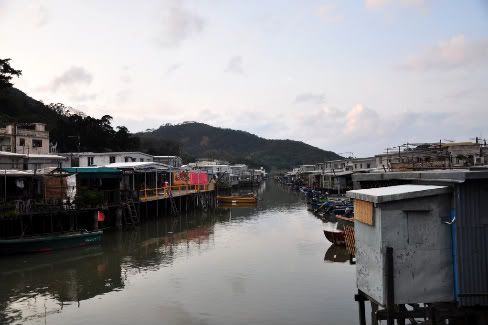As mentioned in our earlier blog, the language of Tanka, or put in simple, Tanka is under going language shift, and very probably language death. To laymen of the language like us, we might really find it a pity that there might be a culture loss including those Sea Water Songs or some unique vocabularies they have. Yet, when we look at it in a more objective way, or from the point of views of their own community, we might find it somehow inevitable that the language death would occur.
As mentioned by Uncle Wing, the Tankas live close to each other in the past; that first of all, family members live close together, and the community is also very small and condensed (Also as seen in the picture taken).
Hence, the language and culture would be more likely to be maintained, and probably carry some sense of solidarity. However, for today, the younger generation had gradually moved away from these houses, and might go onshore and live in a more urbanized area for a better job opportunity, which made them further away and not as familiar as those in the past, and thus, the language is less likely to be able to be kept (Also shown in Fig. 1).
.bmp)
Fig. 1 Uncle Wing's children have moved from Tai O to different urban areas, such as Tung Chung and Tuen Mun.
Next, there are quite a number of terms of the language that are ‘invented’ for fishing activities, however, as mentioned, the younger generation has moved onshore and no longer stays in the fishing industry, they do not use these terms anymore and thus, would make these vocabularies of Tanka be lost. Granny Ho is a good example to illustrate this situation. She was once living on the boat and using the special terms of Tanka. Yet, her family which no longer participates in fishing activities has moved onshore. Thus, the special vocabularies for fishing have died out in her family. Moreover, Granny Ho is now working on the sightseeing sampan, for better communication with the tourists, she even learned a few English vocabularies. This indicates that the working conditions of Tanka people could exert certain impact on their language use.
Facing the shift or even death of the Tanka Language, the attitude of the Tanka people towards this has been unexpectedly neutral. As mentioned earlier, the Tanka community was discriminated, and their language, might in fact be a symbol of discrimination too, thus, losing such language, in the sense of the Tanka, can be seen as losing the identity of being discriminated, thus they did not really feel pity towards it. Like Uncle Wing, during the interview, he always emphasized that there was no difference between the Tankas and those people living onshore, and that the language they used was just the same as Cantonese. It is obvious that he is still afraid of being discriminated by others because of his identity and thus does not want to speak Tanka anymore.
Furthermore, they would see their local language and Sea Water Song as old-fashioned. To put it in another way, having the belief of being urbanized is more advanced, it does not really bother them even if their language and culture are totally lost. For instance, when we asked Granny Ho to sing Sea Water Song, she kept saying that the song has already been outdated and refused to do so. To her, speaking Tanka and singing Tanka songs are out of date, although she likes Sea Water Song very much.
Seemingly strange though, as an outsider, we hope to treasure such unique culture and language, but they, as a member of the community, did not really care to maintain or keep their culture.

No comments:
Post a Comment